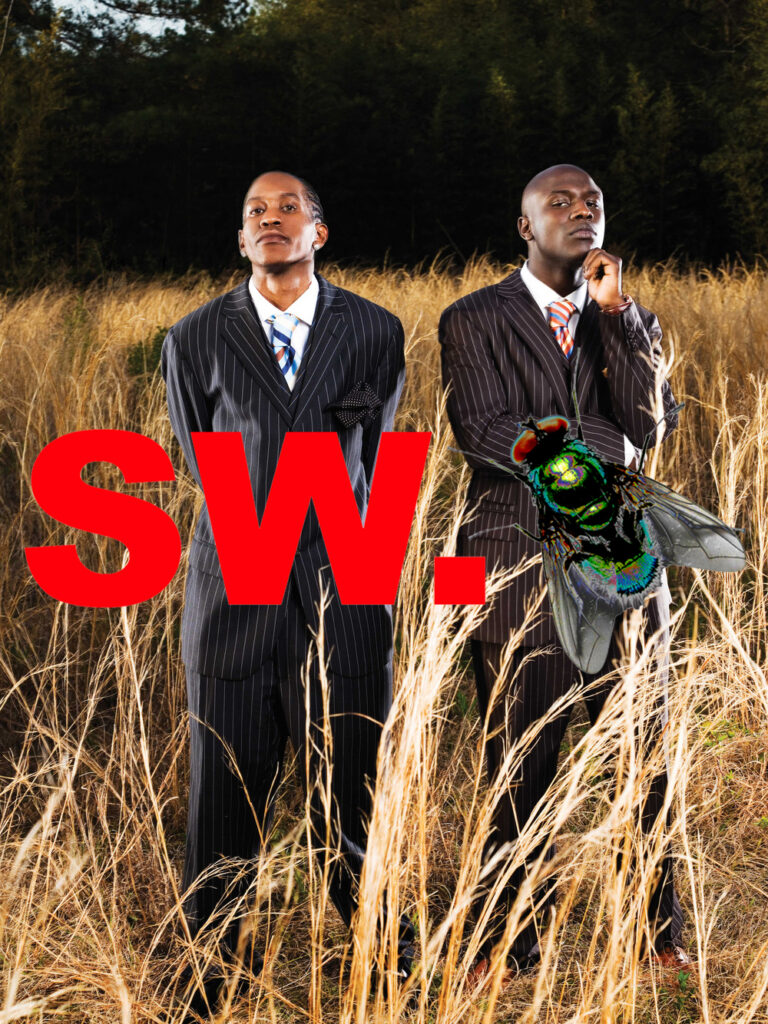
FIELD MOB AND JOY THAT BREAKS TIME
AKOUSUA LOUIS
It’s hotter than a sunny day in hell. The pines reach up high to point at God and light poles ride the cement circling the grassy open area, laying dormant, idle, and jubilant, thanking God the sun picked up the day shift. The light poles aren’t alone in their celebration, though. Scattered between them all in a heavily populated lattice stand people, tall, Black, shining, and smiling, showing pearls of their love to each other through the heat.
Field Mob’s song “At the Park” draws an almost-palpable visual of this mythic concept of the radical, timeless joy of a life defined not by obligation and requirement, but a life intrinsically defined; lived unbound to the white man’s clock, but rather on colored people time –– life in temporal and active resistance to oppressive and violent expectations of inexhaustible productivity.
Field Mob is a duo from Albany, Georgia, deep in the dirty south, entrenched in the musical traditions of their region, fashioning their music to burst from the seams with what is nothing other than a textbook definition of what the South is seen as, and in “At the Park,” they elucidate an image of what a southern Sunday looks like.
“Sunday afternoon exists as an infinite time in-between, where it ceases to be a commodity that can be “spent,” and seems to dissolve from existence entirely, swallowed by love and not to emerge until we say so.”
Shawn Jay opens its first verse with a question: “Now what you gon go do after church?” It is important to highlight that during this whole song, there is no mention of time other than this “after church.” Though there is no specific temporal plane that this line gestures towards, we know exactly where this would fall in the events of the day. The general nature of this indicator stands in contrast to the hyper-specificity of Western concepts of time and promptness, which cage us off from experiencing the beauty of uncertainty and the incredible self-love of showing up on one’s own terms, and not “at 7:00.” Equipped with “a plate of macaroni, pork and beans, and ribs,” Sunday afternoon exists as an infinite time in-between, where it ceases to be a commodity that can be “spent,” and seems to dissolve from existence entirely, swallowed by love and not to emerge until we say so. With no work, no expectations, no obligations left in the day, one is left to simply exist in a blissful nothing. One is free to act, love, and live as they please, the specters of capitalism being sent to the wayside in favor of boundless love.
In the song’s second verse, Chevy P narrates “Some barbequin, playin cards they losin / Gamblers get stupid, then they start to shootin.” Though these lyrics break the peaches-and-cream idea some might have of radical joy, it does not complicate the concept’s reality. Black life has its beauty, and it is a dynamic space that is never entirely “good” or “bad,” but a constantly revolving array of these states as well as everything in-between, coexisting at once. Even with these possibilities afloat, Chevy P reasserts the importance of and enthusiasm behind a radical, timeless joy:
“Can’t wait to get to the park like its money in the mail / We smokin, drankin, kickin it, chillin / Maxin, relaxin, celebratin, yeah.”
To Field Mob, radical joy is more than just a way of living: it’s an eternal celebration of life. After the week beats folks down with the grinding metal of the work schedule, on Sunday, people are finally able to reclaim the freedom of a life lived beyond time. Through their joyfully visceral description of the park after church, Field Mob asserts that you can make that Sunday last as long as you need when you’re living life on colored people time.

One reply on “The Whipping Winds of a Radical Love: A Sonic Timeline of My Struggle for Love and Me”
Loved this one. Was anticipating that I would see something about in the flesh and was pleased to see it